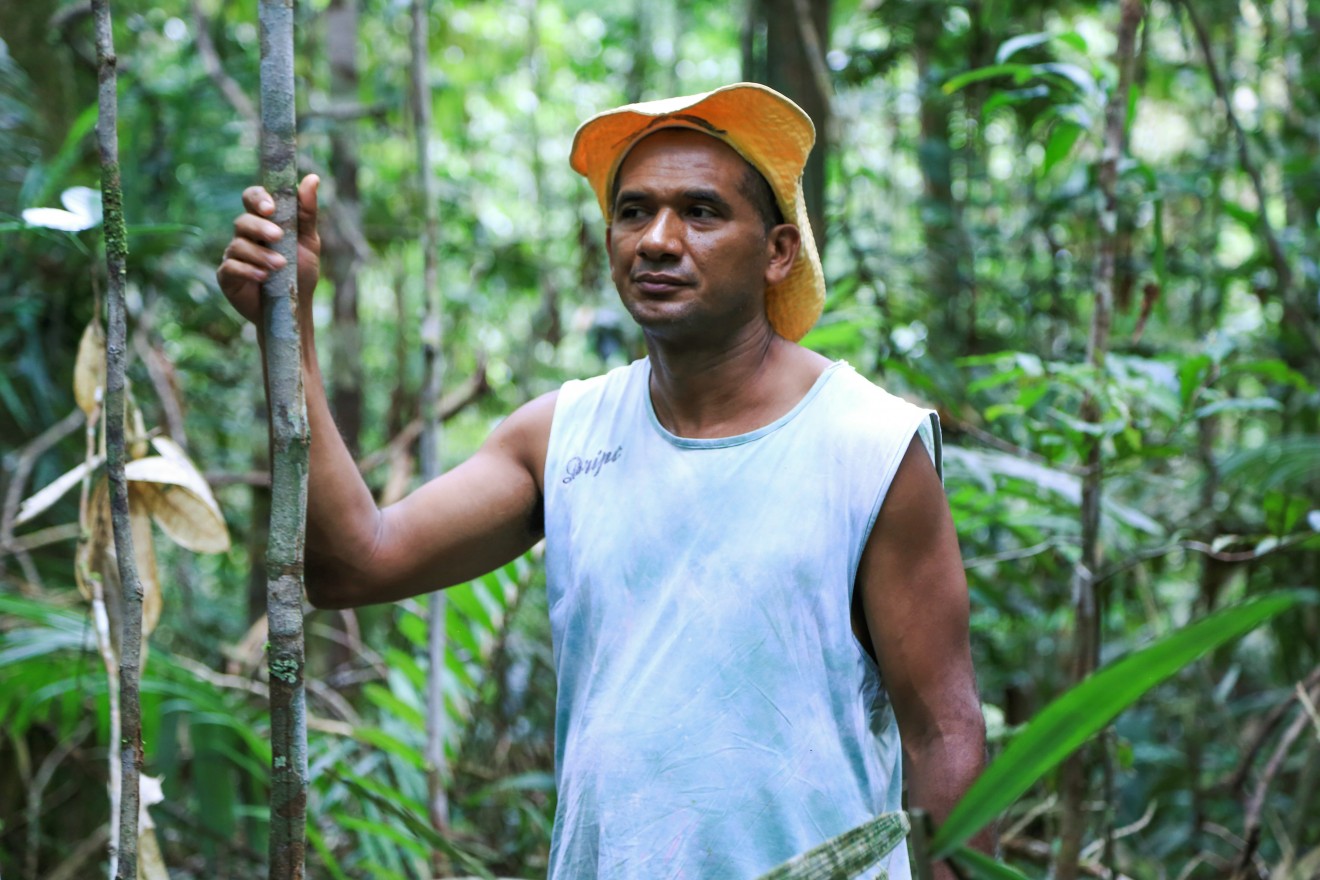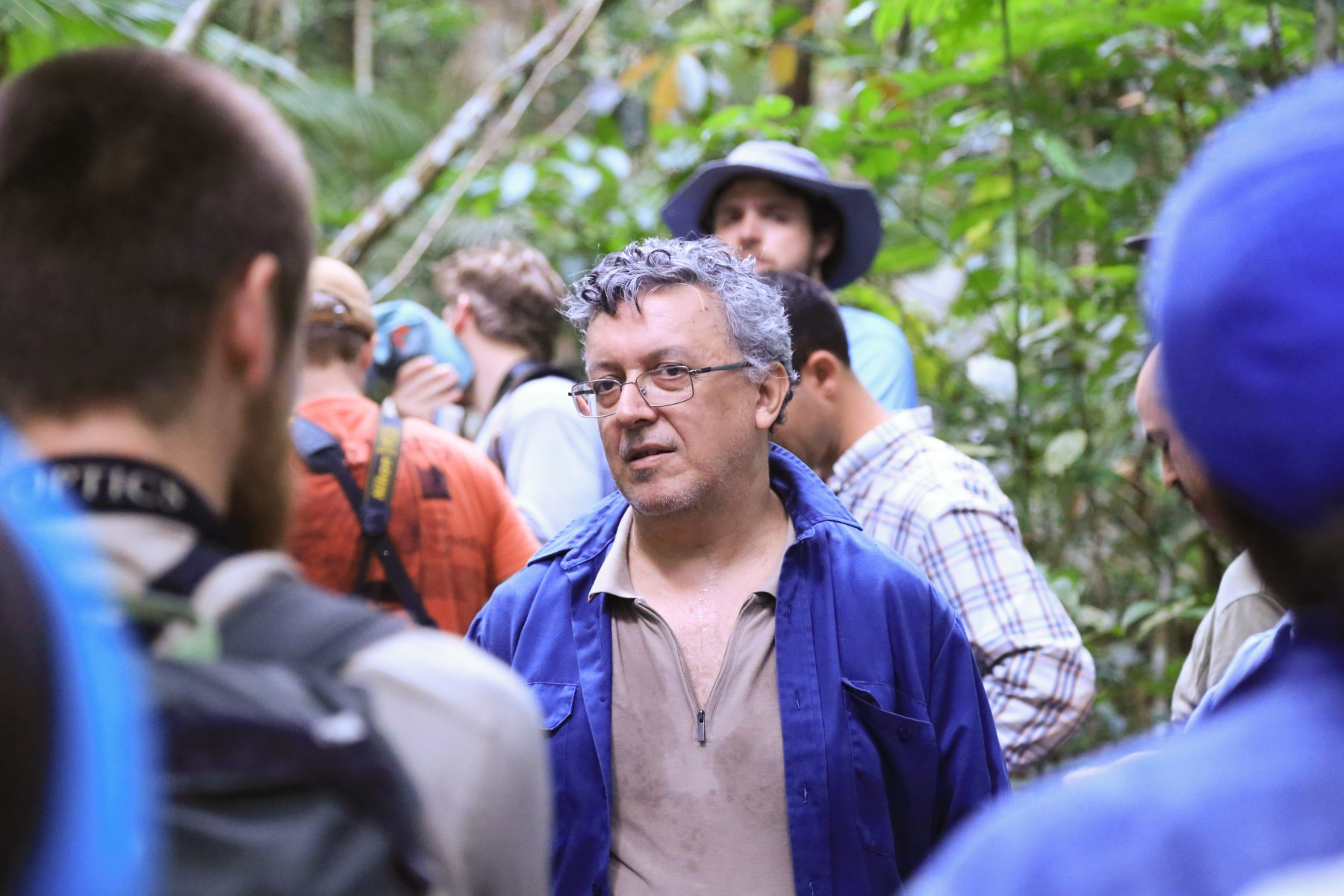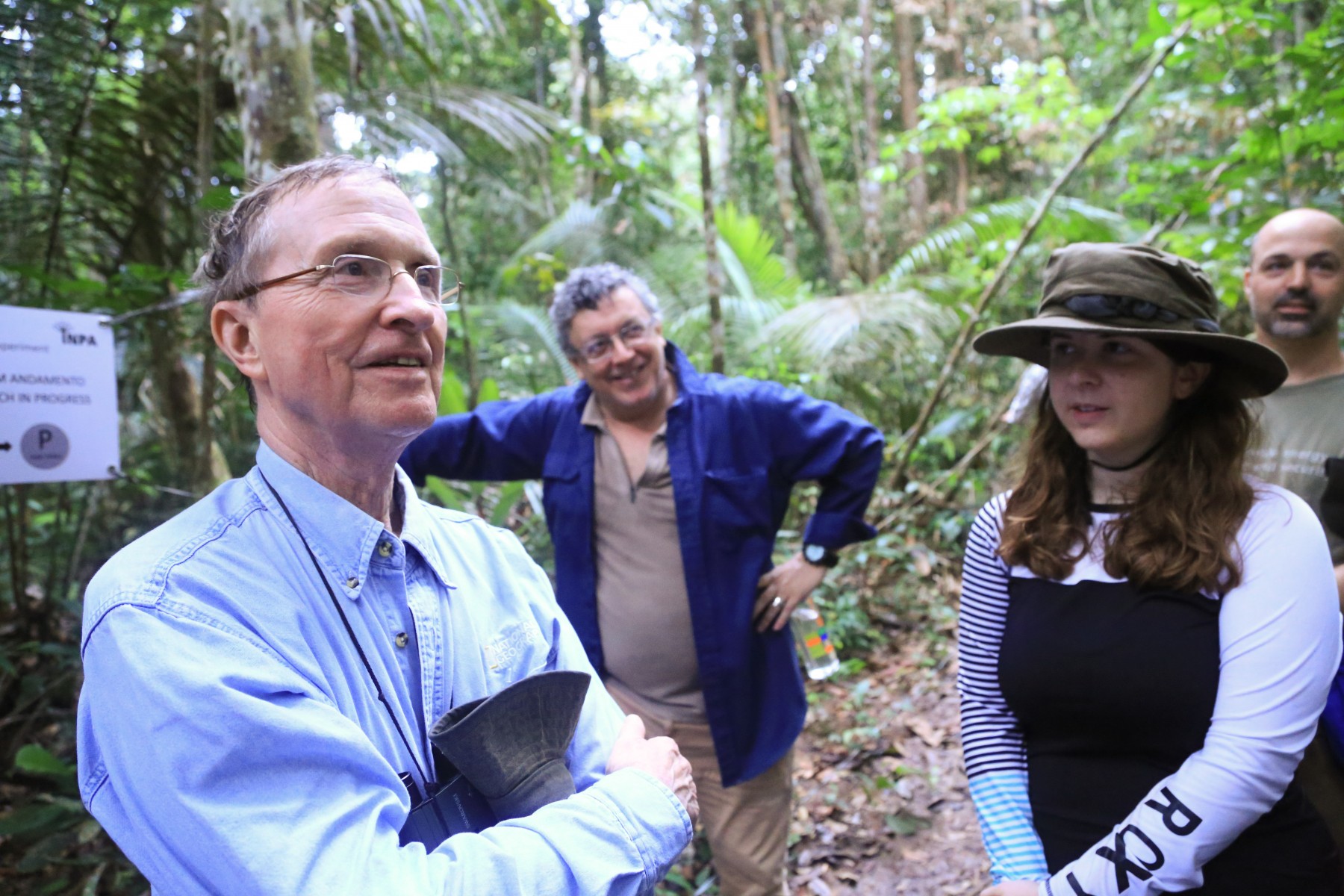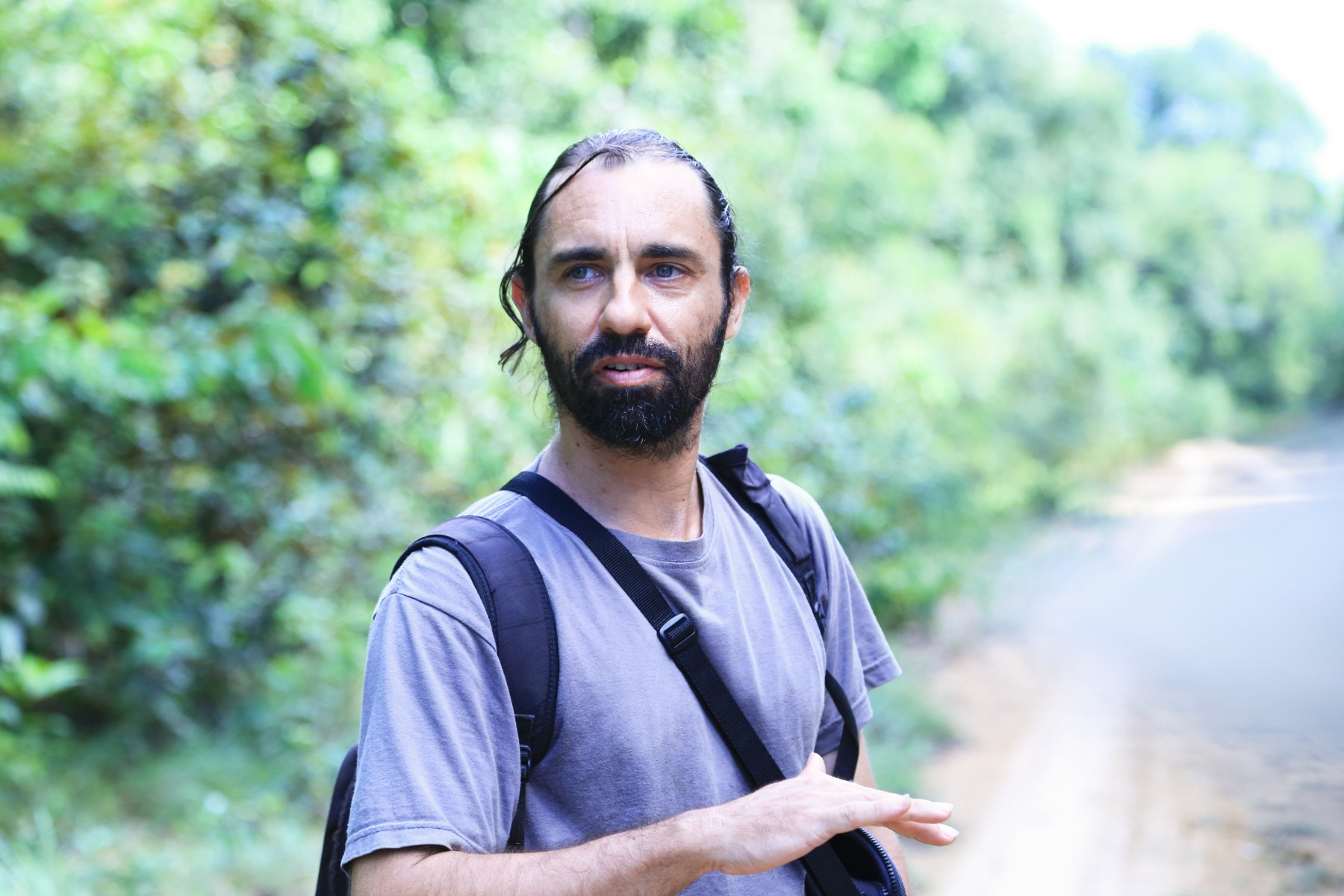
Our guide João Batista da Silva navigated the trails around Camp 41 like it was his own backyard. Researchers at the camp dedicate their lives to the forest every day in order to understand its inner workings. (Photos by PlanetForward.org)

Our guide João Batista da Silva navigated the trails around Camp 41 like it was his own backyard. Researchers at the camp dedicate their lives to the forest every day in order to understand its inner workings. (Photos by PlanetForward.org)
From the smartphones in our hands to the tallest skyscraper, the scientific search for knowledge has shaped every aspect of human civilization and pushed the limits of our technological power. But as our planet reaches its own biological limits, a new kind of science is emerging, one that seeks to understand how human systems can co-exist with natural ecosystems and preserve life on earth as we know it. I traveled to the city of Manaus, Brazil, in the heart of the Amazon rainforest on a trip with Planet Forward to learn from a unique community of scientists who have been on the frontlines of this ecological research.
Working out of small research camps deep in the jungle, out of cell and internet range, for sometimes weeks and months on end, these researchers have not only generated crucial data that is safeguarding the rainforest ecosystem, but also developed a training system for an entire new generation of conservation scientists who are reshaping the Brazilian scientific and political community.
As global climate change accelerates and deforestation rates in the Amazon rainforest reach a five-year high, their work may hold the key to the survival of both the rainforest and the global human community that depends on it.
The strident shrieks of a macaw rang out over my head as I walked down the tiny, muddy footpath that wound around giant ferns and towering banyan-like trees. Around our single-file group, the rainforest sung with a thousand voices of cicadas, insects, and birdsong, interrupted suddenly by a scattershot of crashes signaling the arrival of a troop of capuchin monkeys.
A few hundred feet later, a brilliant blue morpho butterfly bigger than my hand floated across the trail like a wandering will-o’-the-wisp, disappearing back into the shadowy green tapestry of undergrowth. Walking through this experience like a child in wonderland, I almost forgot that I was in the middle of a giant science experiment: Brazil’s Biological Diversity of Forest Fragments Project.
Spanning roughly 100 square kilometers — that’s about 25,000 acres — the Biological Dynamics of Forest Fragments Project, or BDFFP for short, is the largest and longest running ecological study in the world. For nearly four decades, the researchers here have been studying a collection of “forest fragments” — large squares of untouched rainforest standing in former farmland that mimic the isolated patchwork increasingly being created throughout the Amazon by human clearing and burning activities.

Dr. Jose Luis Camargo, an expert plant ecologist and the director of field research at BDFFP, was our guide to the mysteries of the forest. With twinkling eyes and a knack for talking perfectly normally about waking up in his hammock next to a tarantula, Camargo has over 30 years of experience in the rainforest and trains the graduate students who form the heart and soul of BDFFP. He shared his knowledge with us with the warm voice of a lifelong teacher, tinged with deep reverence for the ecosystem he studies.
“We have a series of fragments here of different sizes — 1, 10, and 100 hectare fragments — as well as matching plots in the continuous forest,” Camargo said.
The uniqueness of this setup is that it allows the researchers to compare the populations of trees and animals in the nearby continuous forest to those in areas that are cut off, or “fragmented,” from the main ecosystem, he explained.
Some of these differences need no scientific training to recognize — for example, the blue morphos and monkeys that mesmerized me in the continuous forest plots were conspicuously absent when we visited a forest fragment — but other changes can be more subtle. Forest fragments are drier, Camargo told us, and the trees are more vulnerable to being felled by wind storms. Some species of birds that thrive in deep shade vanish from edges of the fragments.
There are dozens of studies at BDFFP on the effects of fragmentation on the populations of bats, snakes, butterflies, and even termite, but the two most important data sets come from monitoring birds and trees, Camargo said. The tree biodiversity census in particular, provides the researchers with an instrument to measure the pulse and vital signs of the forest- how many trees die, how many grow, and how the species diversity changes.
“[In total], we are monitoring trees in almost 100 hectares spread in this forest — something like 66,000 individual trees,” Camargo said.
“In the last 10 years, we added another area of 25 hectares to the study and in this case we got kind of crazy and we measured and marked all trees bigger than 1 centimeter across. That was about 250,000 trees.”
It is field research on a scale that is difficult to grasp. But despite its grandeur, the foundations of BDFFP originated from a single innovative idea by one scientist trying to understand the richness and interconnectedness of natural life and find out how society could best preserve it.
In 1976, young U.S. scientist Thomas Lovejoy, in search of a “scientific adventure,” flew to the Amazon for the first time to study bird populations. Back then, only a single highway crossed the mighty rainforest, which at the time was 3% deforested (today deforestation is at 20%).
Lovejoy was working as employee No. 13 for a budding organization called the World Wildlife Fund, and a debate was raging in the conservation community as to whether it was best for species to try to protect a single large area of land or several small fragments adding up to the same area. It was, Lovejoy recalls, “white hot as only an academic controversy can be when there is no data.”
His days in Brazil, however, gave the young Lovejoy an idea about how to get that data.
“I knew there was a law that required any ranching project in the Amazon to leave 50% of the land in forest. Suddenly, I wondered if you could persuade the Brazilians to arrange that 50% so we could have a giant experiment,” Lovejoy said.
Despite facing skepticism, Lovejoy got a plane ticket back to the Amazon. Within hours of meeting with the Brazilian officials, he had secured the permission of every major agency to supervise the land clearing and arrange to leave giant squares of forest intact. The BDFFP was born.
The effect the new research project had on rainforest policy in Brazil was nearly immediate and very far-reaching, Lovejoy said, even though it took more than a decade to get solid data on exactly how much biodiversity was being affected by fragmentation.
“Every protected area created once we started this was really large, and they only got larger. They knew we were asking the question, and they concluded that large was probably important.” Lovejoy said.
As it turned out, large was indeed important when it came to the health of an ecosystem. For example, the team found that even their largest 100 hectare fragment would lose half of all its interior forest bird species in less than 15 years if it was isolated from the main forest. In a year’s time, 30% of the trees died off in the fragments, compared to 5% in the un-fragmented forest.
“When you take a cookie-cutter to the forest you start the whole process of species loss.” Lovejoy said, summarizing the conclusions of over three decades of research that have earned him the title “Godfather of Biodiversity.”
“It’s sort of like a radioactive mineral, which loses radioactivity, but instead these fragments lose species.”

Due in no small part to the work of BDFFP, about 60% of the Amazonian rainforest is currently under government protection from logging, mining, or other developments. But perhaps even more important than the results of the data were the impacts on Brazil’s scientific community from young graduate students who, for the first time, had the opportunity to conduct in-depth research on ecological issues in a rich and immersive environment.
“I didn’t realize at first the potential for capacity building that was here. When I first got here, there was very little research going on and what was going on was basic research,” Lovejoy said.
“Now, Brazil has one of the largest groups of conservation biologists of any country other than a first world country, and probably more than some of them.”
More than 80 researchers currently work at BDFFP, including a population of about 45 graduate students, a majority of which are Brazilians, who cycle through in the process of completing their Master’s or Ph.D. degrees. They are housed in seven field research camps scattered around the forest plots, equipped with hammocks, running water, and cooking facilities. Most of the students have their first experience of the Amazon ecosystem here, Camargo said.
“We are really proud at BDFFP that we are increasing the number of trained people in conservation and in ecology in general,” Camargo said.
“We not only just train them but we try to give some incentive to stay in the Amazon. This place needs more trained people to deal with the complexity of the forest and the public politics for this forest,” he said.
Cassiano Gatto is one of those students who decided to dedicate himself to the Amazonian region. Now a Ph.D. candidate, Gatto has been working for six years at BDFFP leading research into the effects of fragmentation on birds. He’s an avid birder: the kind who can casually identify the Latin names and subspecies of birds by their individual voices while strolling about in some of the earth’s richest avian biodiversity.
“Manaus is a mecca for biologists. Each one of the places in the Amazon has its own secrets, and its own huge richness in species,” Gatto said.
Empowering local and native communities to preserve that natural heritage is of particular importance to Gatto. He explained that scientists, NGOs, and communities are working together to create “sustainable development reserves” — protected areas that allow for people to harvest resources from the land but also include research and education on how to sustainably manage resources and avoid over-exploitation of the rainforest.
“I’m not that guy that is against development,” Gatto said. “But it needs to be in a planned way, at least, a rational way, and the benefits must be shared with a lot of people because these are public lands.”

Corruption and the lobbying power of a few powerful representatives in Brazil’s Congress is currently spoiling these public lands, Gatto said. Recently, Brazil’s President Michel Temer, who is under corruption charges, moved to reduce the consequences for land thieves and dissolved a protected reserve the size of Denmark to benefit mining interests.
Other students of Camargo have gone on to fight such influence directly in Brazil’s political sphere. Rita Mesquita, a BDFFP graduate, joined government environmental agencies and at one point became the lead person organizing conservation for the entire state of Amazonas.
“My students are my children,” Camargo said. “If I can convince my students, in a good way, to solve some problems related to sustainability — not imposing them, just to show some alternatives — then I think I’m doing my part.”
Science and education historically has played a crucial role for sustainable development in Brazil. In 1979, before BDFFP started, a revolutionary Brazilian scientist, Eneas Salati, proved for the first time that the Amazon rainforest makes its own rainfall by recirculating rainwater back into the atmosphere. By showing that cutting down the rainforest also would disrupt the hydrological cycle of the entire South American continent, Salati laid the groundwork for decades of political conservation action.
Today, scientists at BDFFP continue Salati’s work, charting the growing impact of climate change and deforestation on the the rainforest’s hydrological cycle and educating people about its importance. Every year, Lovejoy brings celebrities, politicians, and students from Brazil and around the globe to the little camps to experience the magnificence of the Amazon, and Camargo leads Brazilian graduate students on a monthlong field course to understand the ecology of the Amazon basin.
“We have to change the way the society thinks, and we are going to be able to do that only through education,” Camargo said.
The best education also includes moments of deep realization, mingling insight, and awe. Mine came on our second day in Brazil, when Camargo and Lovejoy took our group to watch the sunrise over the forest canopy. We woke at 4 a.m. and climbed a watchtower that stands on a biological reserve right at the border between Manaus and the forest, the place where city meets jungle.
Standing suspended some 150 feet in the air and looking out over the canopy, I was immediately transported to a primeval age. Billows of steam streaked with pink and red from a slow sunrise rose from a sea of trees of every possible hue of green and yellow — virgin forest stretching to the horizon. Toucans hooted and monkeys barked below me, greeting the new day.
.jpg)
After nearly half an hour of enrapturement, we looked to the other side of the watchtower. There, glimmering through pre-dawn smog, the thousand lights of Manaus with its 2 million inhabitants and counting stretched to another horizon dotted by smokestacks and skyscrapers. The dim sound of motorcycles, cars, and machines came floating on the breeze, mixing with the birdsong.
It is at the confluence of these two worlds: the primeval and the modern, the natural and the human that the survival of our species may be decided. Scientists like Gatto and Camargo stand at this frontline, a bridge between both worlds. Theirs is a science that isn’t merely at the service of development but instead in service to the good of humanity.
“We have no choice but to be optimistic, because otherwise we wouldn’t do anything,” Lovejoy said one night in response to a question about the hardships of conservation.
It’s a remarkable statement on the nature of hope that rings even truer since the 2016 election. From the great civil rights movements to the Cold War, humanity’s story is one of finding hope in the darkest of places. The crises of climate change, species extinction, and environmental destruction are no different.
When it comes to preserving the rainforest and all of its gifts for future generations, we can find hope in knowing that the world’s next Eneas Salati or Thomas Lovejoy might be one of the graduate students trudging through the narrow rainforest paths of the BDFFP.